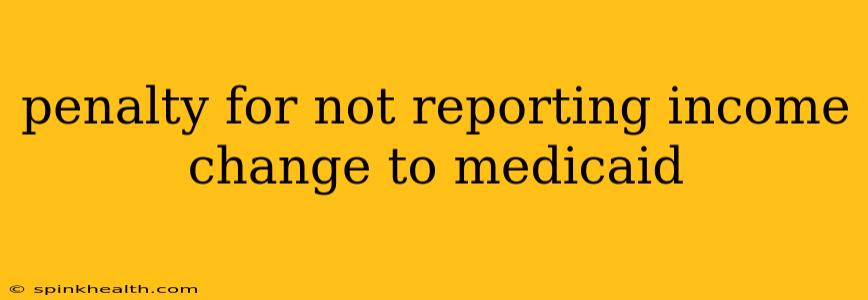The Unseen Consequences: What Happens When You Don't Report Income Changes to Medicaid?
Life throws curveballs. One minute you're comfortably within your Medicaid eligibility, the next, a job change, a raise, or an unexpected inheritance alters your financial landscape. The crucial question then becomes: what happens if you don't report this income change to Medicaid? The answer, unfortunately, isn't simple, and it carries significant weight. It's a story with potential consequences that can dramatically impact your life and finances.
Let's delve into the complexities of this situation, exploring the potential repercussions and addressing some common questions.
What are the Penalties for Not Reporting Income Changes to Medicaid?
This isn't a matter of a simple fine. The consequences of failing to report an income change to Medicaid can be far-reaching and deeply disruptive. The severity of the penalty varies depending on several factors, including your state, the extent of the unreported income, and whether the failure to report was intentional or due to oversight.
Potential penalties can include:
-
Loss of Medicaid coverage: This is the most immediate and significant consequence. Medicaid is a needs-based program, and if your income increases beyond the eligibility threshold, your coverage will be terminated. This means you'll be responsible for the full cost of your healthcare, potentially leading to overwhelming medical debt.
-
Retroactive payments: If you received Medicaid benefits during the period when your income was above the eligibility limit, you may be required to repay those benefits. This can result in a substantial debt, especially if the unreported income spanned a long period.
-
Criminal charges: In some cases, particularly if the failure to report is deemed intentional fraud, you could face criminal charges, leading to fines and even jail time. This is more likely if the unreported income is substantial or if there's a history of similar offenses.
-
Civil penalties: Even without criminal charges, you might face significant civil penalties, including financial fines and administrative sanctions.
-
Damage to your credit score: Outstanding debts related to Medicaid overpayments can negatively affect your credit score, making it difficult to obtain loans, rent an apartment, or even get a job in the future.
What Happens if I Accidentally Fail to Report an Income Change?
It's crucial to distinguish between intentional and unintentional non-reporting. If you failed to report a change in income due to a simple oversight or misunderstanding, being forthright with your Medicaid agency is critical. Explain the situation honestly, provide any supporting documentation you have, and work with the agency to resolve the issue. They may be more lenient in such cases, particularly if you act quickly. However, even unintentional errors can still result in a retroactive repayment requirement.
How Often Should I Report Income Changes to Medicaid?
The frequency of reporting income changes to Medicaid varies by state. Some states require reporting immediately upon any change, while others have reporting deadlines associated with annual renewals or other specific timeframes. Always check your state's specific requirements. It's generally safer to err on the side of caution and report any income change as soon as possible to avoid potential complications.
What if My Income Fluctuates Frequently?
If your income fluctuates frequently, keep detailed records of your earnings. This can help you accurately report changes and provide documentation if necessary. Maintain open communication with your Medicaid caseworker to ensure they are aware of your income situation.
Where Can I Find More Information on Reporting Income Changes?
The best resource for information on reporting income changes to Medicaid is your state's Medicaid agency. Their website will typically provide detailed instructions, contact information, and forms for reporting income changes.
Navigating the complexities of Medicaid can be challenging, but understanding the potential penalties for not reporting income changes is paramount. Open communication with your Medicaid agency, accurate record-keeping, and prompt reporting are your best defenses against unintended consequences. Remember, honesty and proactive engagement are key to maintaining your eligibility and avoiding potentially devastating financial and legal ramifications.

